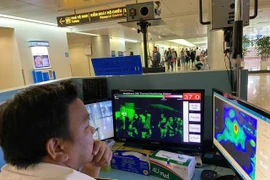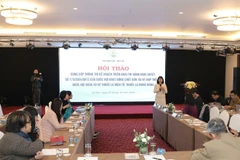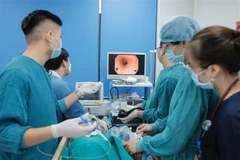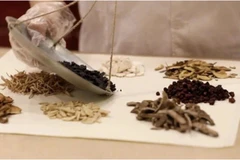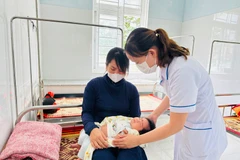Hanoi (VNA) – The Ministry of Health has recommended the public to regularly update official information related to pneumonia caused by the human metapneumovirus (HMPV) to avoid undue panic, but at the same time, take precautions as per the ministry's guidelines.
Addressing a regular Government press briefing on January 8, Deputy Minister Do Xuan Tuyen noted that on January 4, the Chinese Ministry of Foreign Affairs officially stated that the spread of respiratory infections in the country is a common seasonal occurrence peaking in winter and not an unusual health event. The HMPV virus spreads through respiratory droplets and exhibits symptoms similar to the common cold (fever, cough, and nasal congestion). It can lead to complications like pneumonia and bronchitis, with higher risks for children under five, the elderly, and immunocompromised individuals.
Chinese health authorities confirmed that the nation’s healthcare system is not overwhelmed, with current hospital usage rates lower than the same period last year, and no emergency declarations have been made.
The World Health Organisation (WHO) assessed that seasonal outbreaks of respiratory diseases are typical in temperate regions during winter. It recommended basic measures to curb the spread and minimise risks, particularly for vulnerable groups, and advised against imposing trade or travel restrictions linked to current acute respiratory disease trends.
In response to the situation, the Vietnamese Ministry of Health has been actively monitoring developments through its daily surveillance system, in close cooperation with the WHO and the US Centers for Disease Control and Prevention, Tuyen stated.
The health official stressed that Vietnam is also entering the winter-spring season, conducive to respiratory viruses. The ministry has issued guidance to the public and provincial health departments on proactive measures for disease prevention during this period.
People are advised to consume well-cooked food, maintain good hygiene, do regular exercise, use masks in public and crowded spaces, stay warm in cold weather, and ensure children receive full and timely vaccinations.
Those with symptoms should promptly seek medical attention to prevent complications, improper drug use, and antibiotic resistance./.

